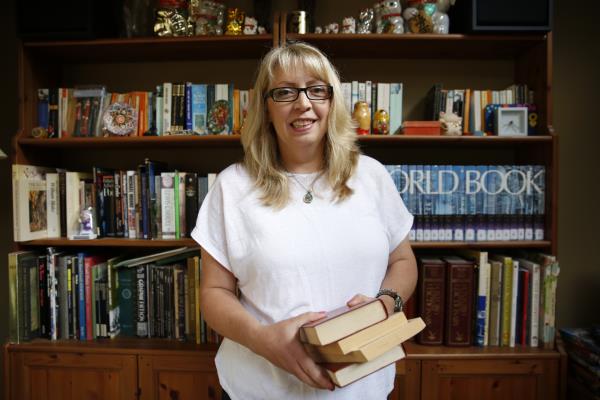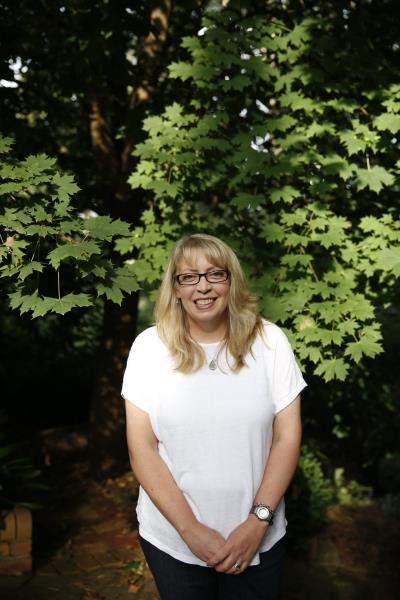
By CASEY NEILL
PRECEDE:
Emerald mum Alison Edwards doesn’t want Parkinson’s disease to define her. She spoke to CASEY NEILL about how she went from walking with a crutch to roller skating with her kids.
Pull quote:
“You kind of go through a grieving period in a way, because you have your life planned out in your head.”
TAKING up tap dancing seems an unlikely response to being diagnosed with a degenerative illness.
But that’s exactly what Alison Edwards, 46, decided to do three years ago after finding out that she had Parkinson’s.
“It probably took me two years to get diagnosed, which is pretty quick from what I’ve heard,” she said.
“It started with a slight limp in my right side which got worse. I think I went to eight doctors.”
Medical opinion on the cause ranged from a compressed disc in her back to multiple sclerosis.
“It got to the point where I couldn’t walk properly without a crutch and I had to stop working,” she said.
Then Alison found a neurologist who specialised in Parkinson’s.
“Because there’s no test (for the disease) the test was to trial me on the medication,” she said.
She’d been taking the drugs for three weeks when she noticed her walking improving.
“I’ve got good news and bad news,” she said to husband Clive Holder.
“That was how I found out.
“It was a relief in a way, but obviously a big shock.
“It took me a while to adjust.
“You kind of go through a grieving period in a way, because you have your life planned out in your head.”
“In a way – this sounds bizarre – but it’s got its advantages because it changed the way I lived my life and the way I look at things.
“I don’t know how long I’m going to be active for so I just want to make the most of every opportunity, whereas before you kind of get stuck in a rut.”
Alison said she wasn’t particularly social before her diagnosis.
“Now I guess I’ve just come out of my shell a bit and I’m doing things like tap dancing,” she said.
“It’s supposed to be good for Parkinson’s too.
“I’m hopeless but I love it, it’s really good.
“We had an end of year concert last year. I had to wear a costume on stage!”
Alison’s children Nellie, 11, and Patrick, 7, have provided support, as has Clive.
“If I get tired he helps out, he does a lot of housework, and he’s supportive when I go off and do all these crazy things like tap dancing,” she said.
Doctors have no idea how the progressive neurological condition will affect Alison.
“It’s so different for everyone,” she said.
“But we’re managing it well and I’ve got a couple of options.
“The drugs eventually wear off and stop working, and they can create side effects. So surgery’s an option.
“Hopefully further down the track they might come up with something new.”
Alison got in touch with Parkinson’s Victoria straight after her diagnosis.
“At the beginning I was a bit gung-ho,” she said.
“I went to a meeting and there was another lady there who had more advanced Parkinson’s.
“I came home and I said ‘I don’t think I want to do this’ because it’s hard to see people around you that are more advanced.
“I thought ‘I don’t want it to define me. I’d just rather live my life. I don’t want it to become my number one topic of conversation’.”
Alison sometimes walks with a limp on her right side and the disease affects her sleep.
“Sometimes my hand doesn’t work properly when I want it to – just cooking, grating, stuff like that,” she said.
But she’s back at work at Monash Public Library Service.
“It was a career change when I had Nellie,” she said.
“I worked in IT and I didn’t think that would be very family-friendly so I went back to uni and I did my grad dip.
“So I’d put her down for her daytime nap and I’d go and study.
“I did it by distance so in the evenings I’d listen to lectures and the number of times I fell asleep and woke up and had to start it again …
“I must be a glutton for punishment – it wasn’t too bad because I did my undergraduate degree part-time while I was working full-time.
“That was harder in a way because I wanted to go out and socialise.
“Doing it when I had Nellie was a bit easier because I was a homebody anyway.”
If she’s not at a library, Alison’s probably packing vegies for The Hills and Valleys Co-op with fellow school mum Melanie Jessop.
Since November 2013 they’ve worked with local famers to provide families with organic produce at affordable prices.
“We pack it into boxes and people come and collect it. We do that once a week,” she said.
“I could never really afford to buy organic fruit and veg normally but this way it’s affordable.
“It’s been a really good thing for the community.
“It’s forced me to use vegetables I wouldn’t normally buy … and the kids are eating more vegies as well.
“You get what’s in season and you just have to work your menu around that.”
Sewing and knitting also keep Alison busy.
“That’s mainly to help my fine motor skills,” she said.
“Last year my mum passed away and she was a big knitter so I guess it was a tribute to her in a way.
“She was always trying to teach me and I never had the patience.
“I learnt to sew and to knit on YouTube and I get books from work, as well.
“I just got a pair of roller skates for my birthday. We went with the kids and I just thought it was really good.
“I don’t particularly like exercising so if there’s a fun way I can do it then I will.
“So that’s my next goal. I don’t think I’m quite up to roller derby or anything – I’m a bit old!”
A Little Free Library book exchange point at Macclesfield Primary School is also on Alison’s to-do list.
“I do sometimes overdo it and I crash, but it takes your mind off things and physically, they say move it or lose it,” she said.
“A lot of people would get diagnosed and just give up.
“I had to laugh last time I saw my neurologist. As I was leaving he said ‘the most important thing is to keep busy and active’.
“If only he knew … ”
Email hillsandvalleycoop@gmail.com or like the group on Facebook for more information.








